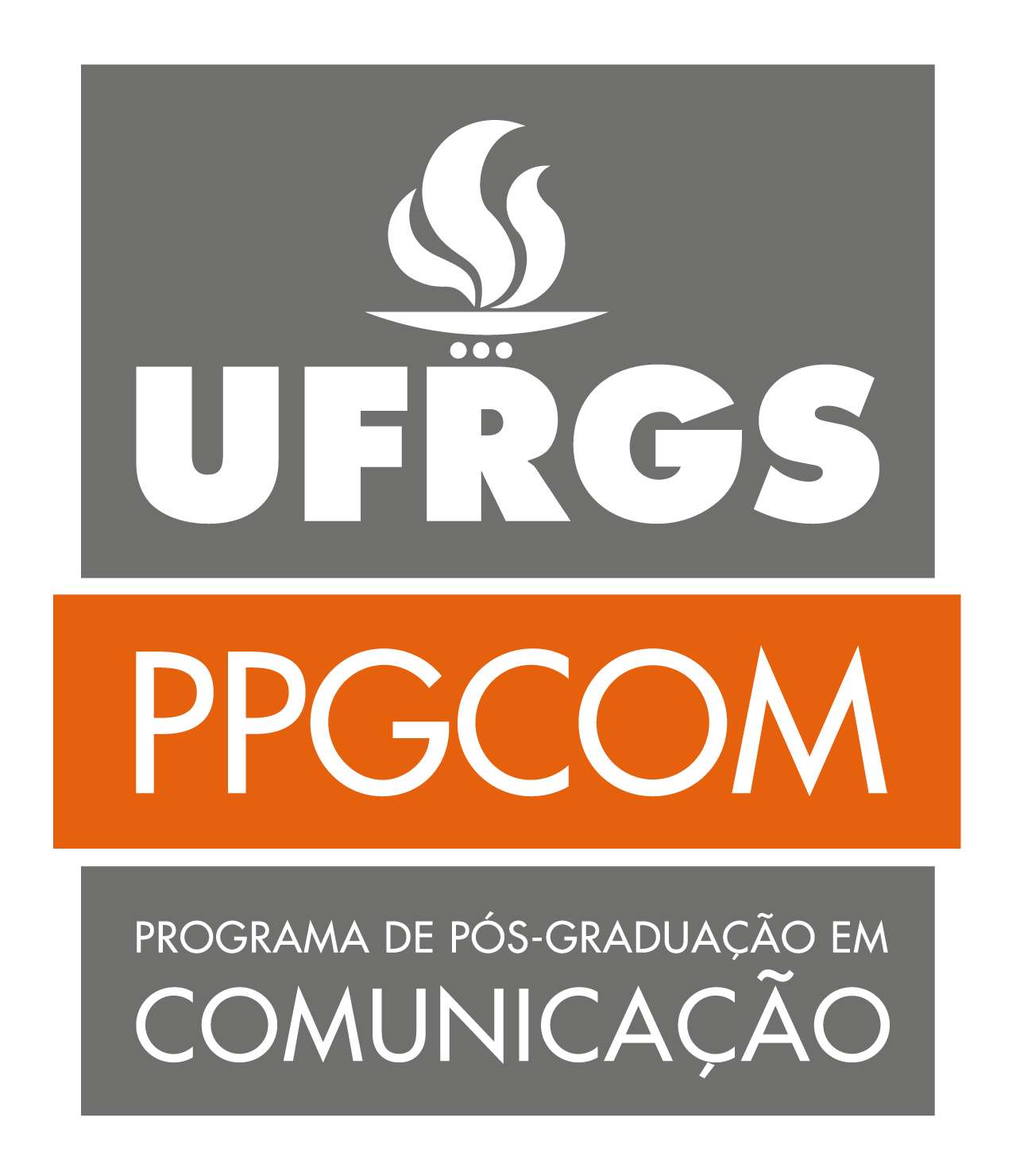Comunicação/Comunicação Digital — uma análise relacionada ao estar juntos no mundo contemporâneo
DOI:
https://doi.org/10.19132/1807-8583201739.24-41Palabras clave:
Comunicação digital. Alteridade. Multiconexão. Incomunicação. Universidade.Resumen
O artigo discute interfaces do pensar comunicativo em torno do duplo eixo Comunicação-Comunicação Digital. O arcabouço teórico a respaldar a trajetória reflexiva enseja análise de implicações relacionadas à ideia do estar juntos no mundo contemporâneo, tais como o uso intensivo das tecnologias digitais, a problemática do receptor, a questão da alteridade no ecossistema comunicativo e o papel da universidade nesse contexto. Os aspectos conclusivos apontam para a atenção necessária aos fatores limitantes do processo comunicacional “moderno”, ao qual se agrega a pressão ininterrupta de interfaces digitais cada vez mais rápidas que, entretanto, não se mostram inteiramente capazes de impedir a incomunicação do indivíduo multiconectado.
Descargas
Citas
ARAÚJO, Marlson Assis de. A ecologia flusseriana da Comunicação: ideias e conceitos-chave. Intercom, Revista Brasileira de Ciências da Comunicação, São Paulo, v. 35, n. 2, p. 373-396, dez. 2012. Disponível em: <http://www.scielo.br/scielo.php?script=sci_arttext&pid=S1809-58442012000200019&lng=en&nrm=iso>. Acesso em: 23 nov. 2016.
AZEVEDO, Jefferson Cabral et al. Ciberdependência: o papel das emoções na dependência de tecnologias digitais. Texto Livre, Belo Horizonte, v. 7, n. 2, 2014. Disponível em: <http://dx.doi.org/10.17851/1983-3652.7.2.148-161>. Acesso em: 14 ago. 2015.
BAITELLO JUNIOR, Norval; CONTRERA, Malena Segura; MENEZES, José Eugênio de O (Orgs.). Os meios da incomunicação. São Paulo: Annablume; CISC, 2005.
BAITELLO JUNIOR, Norval. A era da iconofagia: reflexões sobre imagem, comunicação, mídia e cultura. São Paulo: Paulus, 2014.
BARICHELLO, Eugenia; CARVALHO, Luciana. Mídias sociais digitais a partir da ideia
mcluhaniana de medium-ambiência. Matrizes: Revista do Programa de Pós-Graduação em Ciências da Comunicação da Universidade de São Paulo, São Paulo, ano 7, n. 1, jan./jun. 2013, p. 235-246.
BUBER, Martin. Yo y tú. Buenos Aires: Nueva Visión, 1969.
CITELLI, Adilson. Ensino a distância na perspectiva dos diálogos com a comunicação. Comunicação, Mídia e Consumo, São Paulo, v. 8, n. 22, p. 187-209, jul. 2011.
CORAZZA, Helena. Midiatização e mudanças no processo educativo. In: CONGRESSO BRASILEIRO DE CIÊNCIAS DA COMUNICAÇÃO, 35, 2012, Fortaleza. Anais... Fortaleza: UNIFOR, 2012.
CURY, Lucilene. Reflexões a respeito do papel da universidade face à tecnociência. In: CONGRESSO BRASILEIRO DE CIÊNCIAS DA COMUNICAÇÃO, 23, 2000, Manaus. Anais... Manaus: 2000.
CURY, Lucilene. O dilema da pesquisa. São Paulo: EDUSP, 2008.
CURY, Lucilene; AZAMBUJA, Marcos Jolbert Cáceres; FELÍCIO, Maurício Cruz. Comunicacão ou conexão? Revista GeMinis, São Carlos, v. 6, n. 1, 2015. Disponível em: <http://www.revistageminis.ufscar.br/index.php/geminis/article/view/230/0>. Acesso em: 9 nov. 2016.
FLUSSER, Vilém. O mundo codificado. São Paulo: Cosac-Naify, 2013.
LATOUR, Bruno. Reagregando o social: uma introdução à teoria do ator-rede. Salvador: Edufba, 2012.
MARTÍN-BARBERO, Jesús. Heredando el Futuro. Pensar la Educación desde la
Comunicación. Nómadas. Bogotá, n. 5, p. 10-22, 1996.
MARTÍN-BARBERO, Jesús. Dos meios às mediações - comunicação, cultura e hegemonia. Rio de Janeiro: UFRJ, 2009.
MARTINO, Luís Mauro Sá. Teoria das mídias digitais: linguagens, ambientes e redes. Petrópolis: Vozes, 2014.
MARTINS, Beatriz Cintra. Autoria em rede: os novos processos autorais através das redes eletrônicas. Rio de Janeiro: Mauad, 2014.
MORIN, Edgar. O método VI: ética. Porto Alegre: Sulina, 2005.
NÓVOA, António. Em busca de liberdade nas universidades: para que serve a pesquisa em Educação? Educação e Pesquisa, São Paulo, v. 41, n. 1, p. 263-277, jan./mar. 2015. Disponível em: <http://www.scielo.br/scielo.php?script=sci_arttext&pid=S1517-97022015000100263&lng=pt&nrm=iso>. Acesso em: 12 ago. 2015.
ROSA, Hartmut. Social acceleration: a new theory of modernity. New York: Columbia University, 2013.
SANTOS, Milton. Metamorfoses do espaço habitado: fundamentos teóricos e metodológicos da Geografia. São Paulo: EDUSP, 2014.
SHIRKY, Clay. Lá vem todo mundo – o poder de organizar sem organizações. Tradução Maria Luiza X. de A. Borges. Rio de Janeiro: Zahar, 2012.
SILVA, Maurício Ribeiro. Os caminhos da incomunicação. In: BAITELLO JUNIOR, Norval; CONTRERA, Malena Segura; MENEZES, José Eugênio de O. (Orgs.) Os meios da incomunicação. São Paulo: Annablume; CISC, 2005.
SODRÉ, Muniz. A ciência do comum: notas para o método comunicacional. Petrópolis: Vozes, 2014.
TOURAINE, Alain. Pensar outramente. Petrópolis: Vozes, 2009.
WEIL, Pierre. A normose informacional. Ciência da Informação, Brasília, v. 29, n. 2, p. 61-70, Ago. 2000. Disponível em: <http://www.scielo.br/pdf/ci/v29n2/a08v29n2>. Acesso em: 22 nov. 2016.
WOLTON, Dominique. Internet, e depois? Uma Teoria Crítica das novas Mídias. Porto Alegre: Sulina, 2003.
WOLTON, Dominique. La otra mundialización: los desafios de la cohabitación cultural global. Barcelona: Gedisa, 2004.
WOLTON, Dominique. Pensar a comunicação. Tradução Zélia Leal Adghirni. Brasília: Editora Universidade de Brasília, 2004a.
WOLTON, Dominique. É preciso salvar a comunicação. Tradução Vanise Pereira Dresch. São Paulo: Paulus, 2006.
WOLTON, Dominique. Aula Magna de Pós-Graduação com Dominique Wolton. Faculdade Cásper Líbero, São Paulo, 18 mar. 2015.
Descargas
Publicado
Cómo citar
Número
Sección
Licencia
Derechos de autor 2017 Lucilene Cury, Sandra Pereira Falcão

Esta obra está bajo una licencia internacional Creative Commons Atribución-NoComercial 4.0.
Los derechos de autor de los artículos publicados en esta Revista pertenecen a los autores, y los derechos de la primera publicación están garantizados para la revista. Por estar publicados en una revista de acceso libre, los artículos son de uso gratuito, con la atribución apropiada, en las actividades educativas y no comerciales.
La revista utiliza la Licencia Creative Commons Attribution (CC BY-NC 4.0), que permite el intercambio de trabajo con el reconocimiento de la autoría.
Autoarchivo (política de repositorios): se permite a los autores depositar todas las versiones de sus trabajos en repositorios institucionales o temáticos, sin período de embargo. Se solicita, siempre que sea posible, que se agregue la referencia bibliográfica completa de la versión publicada en Intexto (incluido el enlace DOI) al texto archivado.
Intexto no cobra ninguna tarifa por el procesamiento de artículos (article processing charge).














